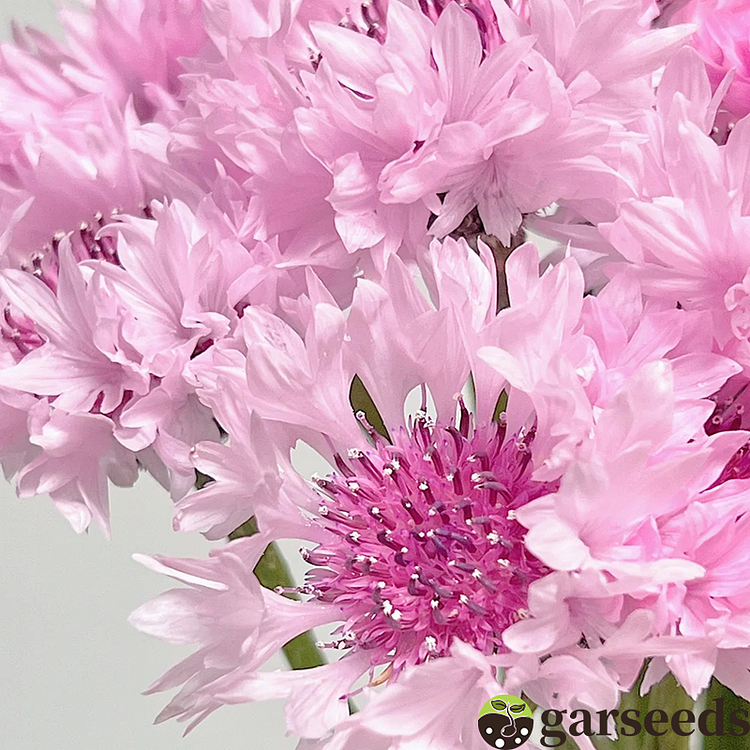Cornflower Seeds
Couldn't load pickup availability
Description
Cornflowers (Centaurea cyanus), also known as bachelor's buttons, are charming, delicate annuals that are prized for their vibrant blue, purple, pink, and white blooms. These striking flowers, with their feathery petals, are not only visually stunning but are also symbolic of hope and resilience. Cornflowers are easy to grow and thrive in sunny garden spots, making them a favorite for both novice and experienced gardeners. Their graceful, daisy-like appearance and long-lasting blooms make them ideal for flower beds, wildflower gardens, and even as cut flowers in arrangements.
Key Features
- Vibrant, Multi-Colored Blooms: Cornflowers come in shades of blue, purple, pink, and white, creating a colorful display that lasts throughout the growing season.
- Symbol of Hope: Known as the Flower of Hope, cornflowers have long been associated with resilience, optimism, and new beginnings.
- Easy to Grow: Cornflowers are hardy and adaptable, thriving in a variety of soil types and requiring minimal care once established.
- Attracts Pollinators: The bright, nectar-rich flowers attract bees, butterflies, and other beneficial insects, making them a great addition to pollinator-friendly gardens.
- Long-Lasting Blooms: Cornflowers bloom from early summer to late fall, providing months of vibrant color and visual interest in the garden.
Why Choose Cornflower Seeds?
Cornflower seeds are an excellent choice for gardeners seeking a low-maintenance, colorful addition to their garden. Their easy growth habit, combined with their striking flowers and pollinator-friendly nature, makes them perfect for wildflower gardens, cottage gardens, or even as borders in traditional flower beds. The symbolic meaning of hope also makes cornflowers a thoughtful gift or a meaningful addition to your garden design. Whether used in fresh flower arrangements or as part of a larger landscape, cornflowers are a versatile and beautiful choice.
How to Grow and Care for Cornflower Seeds
- Planting: Cornflowers can be direct-seeded into the garden in early spring after the last frost date, or sown indoors 6–8 weeks before the last frost. Scatter the seeds over prepared soil and lightly rake them in. If starting indoors, transplant seedlings once the danger of frost has passed.
- Soil Requirements: These flowers prefer well-drained, moderately fertile soil with a slightly alkaline to neutral pH (6.5–7.5). They can tolerate poor soil but perform best with good drainage and light soil amendments.
- Spacing: Space plants about 12–18 inches apart to allow for good air circulation and to prevent overcrowding.
- Watering: Cornflowers require regular watering, particularly during dry spells. However, they do not like to sit in waterlogged soil, so ensure good drainage to prevent root rot.
- Temperature: Cornflowers thrive in full sun and cooler temperatures, typically between 60–75°F (15–24°C). They tolerate some light shade, especially in hotter climates.
- Maintenance: Deadhead spent flowers regularly to encourage additional blooms. Cornflowers are self-sowing and may come back year after year if allowed to set seed. However, cut back or remove spent plants in late fall to prevent excessive self-seeding and maintain a tidy garden appearance.
Benefits of Growing Cornflower Seeds
- Symbol of Hope and Resilience: Cornflowers are not only beautiful but carry deep symbolic meaning, making them an inspiring addition to any garden.
- Pollinator Friendly: The bright, nectar-rich flowers attract bees, butterflies, and other pollinators, contributing to a healthy garden ecosystem.
- Easy to Grow: With their low-maintenance care and hardy nature, cornflowers are perfect for gardeners of all skill levels.
- Long Blooming Period: Blooming from early summer until the first frost, cornflowers offer months of vibrant color in your garden.
- Versatile Use: Perfect for flower beds, wildflower gardens, and container planting, cornflowers add color and charm to a variety of garden settings.





